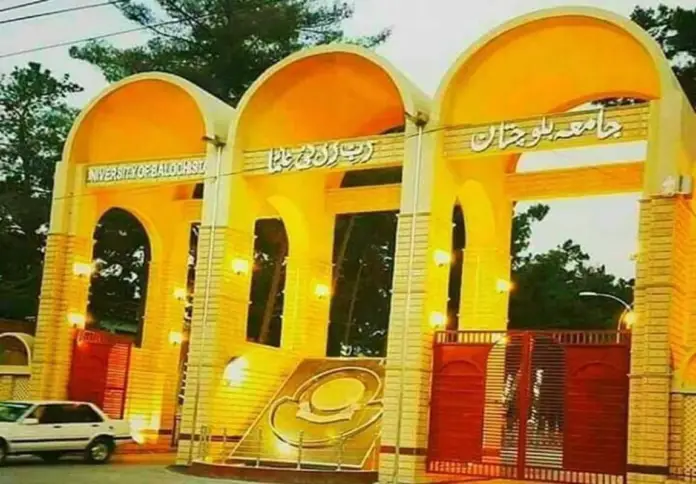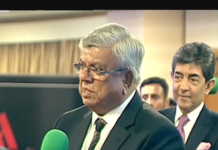Female students celebrated International Women’s Day after clashes with the University of Balochistan administration in the varsity on Tuesday.
The varsity disapproved their request to use the institutional hall, saying that they were not “permitted from above” to give the Baloch students the hall for the ceremony. In protest, the Baloch female students held the ceremony outside the administration block. A large police force was called to the institution, and several departments were restrained from conducting their classes by the administration “in the name of security concerns”.
The ceremony – held only for women – included various segments such as panel discussions, paper discussions, speeches, drama, classical dance and songs. The students organized a book fair at the end of the ceremony. Moderated by the Central Committee (CC) member of Baloch Students Action Committee (BSAC) Sumayya Baloch, the panel discussion was about “Baloch Women and Politics”.
The guests were Zeen Gul Baloch, the organiser of Baloch Women Forum (WWF), and Sadia Baloch, a Baloch student activist, who discussed the role and significance of Baloch women in politics. The panelists said that the biggest issues which Baloch women faced included restricting the Baloch women behind the four walls and replacing the Baloch ancient culture and traditions with an external one.
While speaking on the lack of participation of Baloch women in politics, the panelists said that an “expired and corrupt political environment” was shown to the Baloch society which discouraged the women from participating in mass politics. Because of a lack of political activities in their early life, the panelists quoted, no political consciousness could be generated in the Baloch women that they could also participate in politics. The panelists encouraged the women to look into politics from their own eyes and try to get into it if they were to become the part of national formation.
The other panel discussion included two young Baloch women, Sahira Baloch and Aisha Baloch, whose brothers and father were allegedly disappeared. The discussion was entitled as “Missing Education” mainstreaming the losses to Baloch women education after the “forcible disappearances of their beloveds”. While speaking to the gathering, the panelists said that when they were small, their beloveds were disappeared which “robbed from us our childhood”.
Sahira said that she held the first position in class 8 after which her brothers ‘disappeared’. “After that, I was sometimes in Quetta, sometimes in Islamabad’s D-Chowk, sometimes at Karachi Press Club and sometimes somewhere else which has largely disturbed my education,” she added with tears in her eyes.
The other panelist, Aisha, added that when one’s father was missing, how could they focus on education. She said that not only financially, but her entire family had been suffering from mental pressures too. In the other segments, a discussion was arranged where Balochi and Brahvi speakers discussed Baloch women and their grievances.







